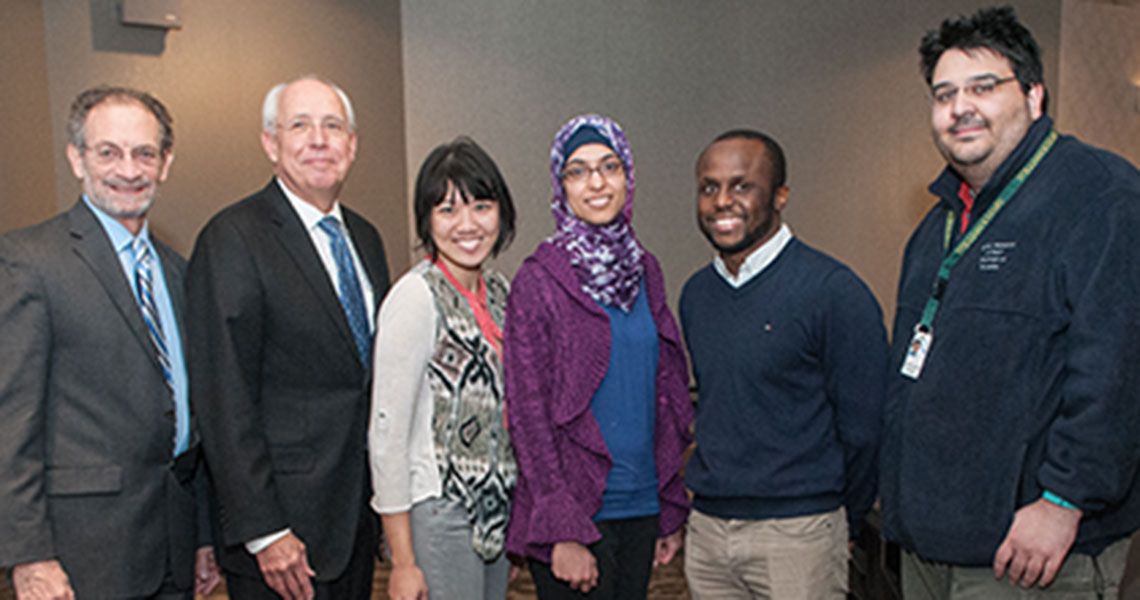“Of the 141 U.S. medical schools, no one is closer to the epicenter of political dysfunction in our nation than you are,” Darrell Kirch, M.D., president and CEO of the Association of American Medical Colleges (AAMC), reminded an audience of students, residents, and faculty from the Department of Psychiatry during his grand rounds address at the GW School of Medicine and Health Sciences (SMHS) Jan. 16. “So this should feel very relevant to you,” he said, as he began his presentation titled “Academic Medicine Confronts Political Dysfunction: Our Moment of Truth.”
Kirch, a former SMHS faculty member, asserted that our national moment of truth in politics and health care has led to a moment of truth in academic medicine, including a unique set of challenges facing the psychiatry profession. “We make up just six percent of the hospitals in the country,” Kirch said of teaching hospitals, “but we see over a quarter of all Medicaid patients. The political map bleeds into health care and affects our nation’s health care status.”
Kirch outlined four issues that he believes have led to our national health care moment of truth: access, affordability, outcomes, and the disputable physician shortage. In the post-Affordable Care Act environment, Kirch believes that the affordability challenge is not only about cost, but also about the failure of physicians to own an appropriate share of the responsibility for those costs. He cited a study published in the Journal of the American Medical Association (JAMA) that found that only one-third of physicians believe they bear responsibility for health care costs. “Someone once said that the major driver of health care costs in the United States is the physician’s pen,” Kirch recalled. “That was in the days before electronic order entry, but it still holds.”
Kirch praised an Aug. 2013 article in The Atlantic by Danille Ofri, M.D., who diagnosed the results of the JAMA survey as a product of learned helplessness. “It’s compassion fatigue, responsibility fatigue,” Kirch explained. “Physicians feel helpless against all the forces at work in society and health care.”
Next, Kirch turned to the widespread assertion that the United States will have a physician shortage approaching 100,000 by the end of this decade. “It’s important to remember that what determines the number of doctors in the United States isn’t the number of medical students graduating,” he said. “We’ve increased that number by 30 percent. It’s the residencies that haven’t increased.” Over 1,000 students graduating from LCME-accredited medical schools last year were unable to find first-year post-graduate residency positions, Kirch noted.
He then turned to the specific challenges faced by the field of psychiatry, including poor mental health coverage and inadequate reimbursement, ongoing stigma, and inaccurate media portrayals. “We are exactly where we were at the turn of the century, 14 years ago,” Kirch lamented. “Patients are still better reimbursed under Medicare for having a plug of ear wax removed than for a psychotherapy session or end-of-life discussion.” It remains easy to isolate the mentally ill, he added. Despite media portrayals suggesting otherwise, “those with mental disorders are far more likely to be the victims of violence than the perpetrators,” he said.
Kirch outlined six ways that he believes the field of psychiatry should approach the current challenges in medical education: encourage positive learning environments, accept responsibility for affordable and accessible mental health care, define a role on the interprofessional teams needed to provide comprehensive patient care, help build a culture to support our vision of the future, develop new kinds of leadership skills, and recommit to the core ethics of medicine.
“Don’t fall into helplessness about all of this,” Kirch encouraged his audience. “I don’t think we’re going to have all Americans insured in the next decade, but we can make a lot of headway. Six million people in three months is pretty good.” He closed by quoting Theodore Parker and Martin Luther King Jr. “‘The arc of the moral universe is long, but it bends toward justice.’ Remember that it does bend in this country. And it has consistently bent in the right direction thus far.”



